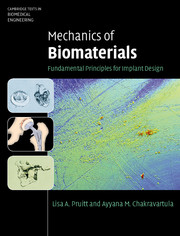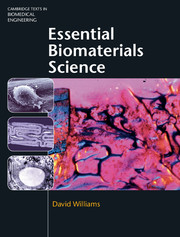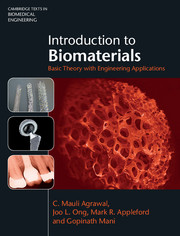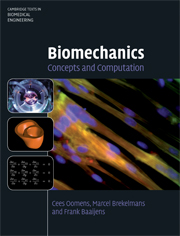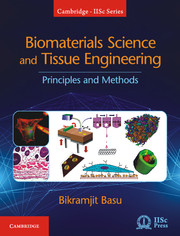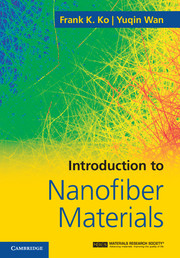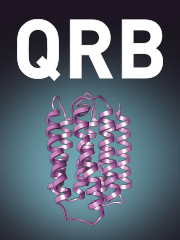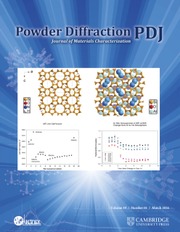Mechanics of Biomaterials
Fundamental Principles for Implant Design
$135.00 (C)
Part of Cambridge Texts in Biomedical Engineering
- Authors:
- Lisa A. Pruitt, University of California, Berkeley
- Ayyana M. Chakravartula, Exponent, Inc., Menlo Park, California
- Date Published: December 2011
- availability: Available
- format: Hardback
- isbn: 9780521762212
$
135.00
(C)
Hardback
Other available formats:
eBook
Looking for an examination copy?
If you are interested in the title for your course we can consider offering an examination copy. To register your interest please contact collegesales@cambridge.org providing details of the course you are teaching.
-
Teaching mechanical and structural biomaterials concepts for successful medical implant design, this self-contained text provides a complete grounding for students and newcomers to the field. Split into three sections: Materials, Mechanics and Case Studies, it begins with a review of sterilization, biocompatibility and foreign body response before presenting the fundamental structures of synthetic biomaterials and natural tissues. Mechanical behavior of materials is then discussed in depth, covering elastic deformation, viscoelasticity and time-dependent behavior, multiaxial loading and complex stress states, yielding and failure theories, and fracture mechanics. The final section on clinical aspects of medical devices provides crucial information on FDA regulatory issues and presents case studies in four key clinical areas: orthopedics, cardiovascular devices, dentistry and soft tissue implants. Each chapter ends with a list of topical questions, making this an ideal course textbook for senior undergraduate and graduate students, and also a self-study tool for engineers, scientists and clinicians.
Read more- Teaches mechanical and structural biomaterial concepts for successful implant design
- Includes step-by-step design guidelines throughout, enabling readers to understand how multiple aspects of failure can be evaluated for a material or device
- Contains medical device case studies (orthopedic, cardiovascular, dental, soft tissue), which give the reader an in-depth view of implant evolution and design issues in four key clinical areas
Reviews & endorsements
"Mechanics of Biomaterials is the textbook I have been waiting for. This comprehensive work synthesizes the science and engineering of biomaterials that has developed over the past three decades into a highly useful textbook for training students in two of the senior undergraduate/first-year graduate student courses I teach: Advanced Biomechanics, and Biomaterials and Medical Devices. In fact, as I reviewed this work it felt like I was reviewing my own lecture notes developed over 20 years. The work combines materials science, mechanics and medical device design and analysis in a seamless and thorough manner incorporating many critical studies from the literature into a clear and comprehensive work. Pruitt and Chakravartula have succeeded in developing an outstanding text and reference book that should be required reading for all who aspire to design, develop and evaluate medical devices." Jeremy L. Gilbert, Syracuse University
See more reviews"The authors have written a detailed yet easy-to-read book that can be used by materials scientists and biomedical engineers, from both the budding biomedical engineering student to the seasoned medical device designer. It combines the fundamentals of plastics, metals, and ceramics behavior with the required properties for the often challenging loading and environmental conditions found in the body. I particularly liked Pruitt and Chakravartula's technique of introducing a detailed discussion of the theoretical explanation of a particular material class's response to a loading environment, and then providing a real-life case study demonstrating how the theoretical response translates to clinical performance. The book is rich in practical examples of biomaterials used in permanent implants currently on the market. Sufficient historical information is provided on implant successes and failures to appreciate the challenges for material and design selection in the areas of both hard and soft tissue replacement." Stephen Spiegelberg, Cambridge Polymer Group, Inc., MA, USA
"Mechanics of Biomaterials: Fundamental Principles for Implant Design provides a much needed comprehensive resource for engineers, physicians, and implant designers at every level of training and practice. The book includes a historical background which outlines the engineering basis of traditional implant designs, and interactions of materials, biology, and mechanics resulting in clinical success or failure of these devices. Each chapter contains a detailed description of the engineering principles which are critical to understand the mechanical behavior of biomaterials and implants in vivo. The scope of the text covers orthopaedics, cardiovascular devices, dental, and soft tissue implants, and should help considerably in our efforts to improve the function and durability of biomaterials and implants used in clinical practice." Michael Ries, University of California, San Francisco
Customer reviews
Not yet reviewed
Be the first to review
Review was not posted due to profanity
×Product details
- Date Published: December 2011
- format: Hardback
- isbn: 9780521762212
- length: 698 pages
- dimensions: 254 x 203 x 38 mm
- weight: 1.62kg
- contains: 375 b/w illus. 35 tables 115 exercises
- availability: Available
Table of Contents
Part I. Materials:
1. Biocompatibility, sterilization and materials selection for implant design
2. Metals for medical implants
3. Ceramics
4. Polymers
5. Mechanical behavior of structural tissues
Part II. Mechanics:
6. Elasticity
7. Viscoelasticity
8. Failure theories
9. Fracture mechanics
10. Fatigue
11. Friction, lubrication and wear
Part III. Case Studies:
12. Regulatory affairs and testing
13. Orthopedics
14. Cardiovascular devices
15. Oral and maxillofacial devices
16. Soft tissue replacements
Appendix A. Selected topics from mechanics of materials
Appendix B. Table of material properties of engineering biomaterials and tissues
Appendix C. Teaching methodologies in biomaterials
Glossary
List of symbols.-
General Resources
Find resources associated with this title
Type Name Unlocked * Format Size Showing of
This title is supported by one or more locked resources. Access to locked resources is granted exclusively by Cambridge University Press to instructors whose faculty status has been verified. To gain access to locked resources, instructors should sign in to or register for a Cambridge user account.
Please use locked resources responsibly and exercise your professional discretion when choosing how you share these materials with your students. Other instructors may wish to use locked resources for assessment purposes and their usefulness is undermined when the source files (for example, solution manuals or test banks) are shared online or via social networks.
Supplementary resources are subject to copyright. Instructors are permitted to view, print or download these resources for use in their teaching, but may not change them or use them for commercial gain.
If you are having problems accessing these resources please contact lecturers@cambridge.org.
Instructors have used or reviewed this title for the following courses
- Advanced Biomaterials
- Biomaterials
- Biosolids
- Introduction to Biomaterials
- Materials in Medicine
Sorry, this resource is locked
Please register or sign in to request access. If you are having problems accessing these resources please email lecturers@cambridge.org
Register Sign in» Proceed
You are now leaving the Cambridge University Press website. Your eBook purchase and download will be completed by our partner www.ebooks.com. Please see the permission section of the www.ebooks.com catalogue page for details of the print & copy limits on our eBooks.
Continue ×Are you sure you want to delete your account?
This cannot be undone.
Thank you for your feedback which will help us improve our service.
If you requested a response, we will make sure to get back to you shortly.
×
